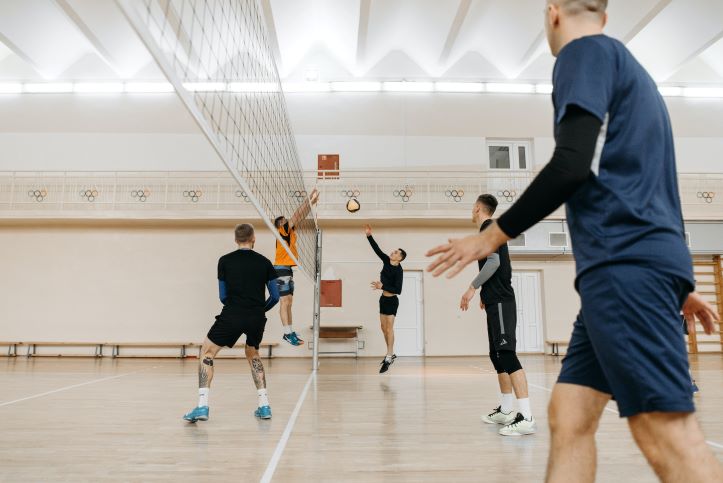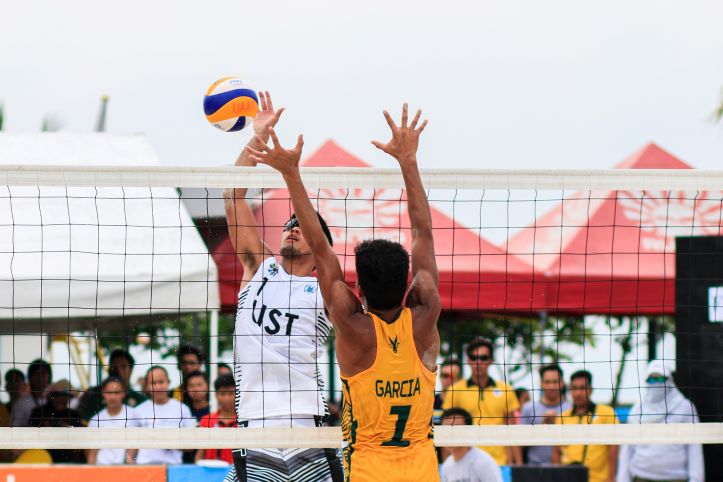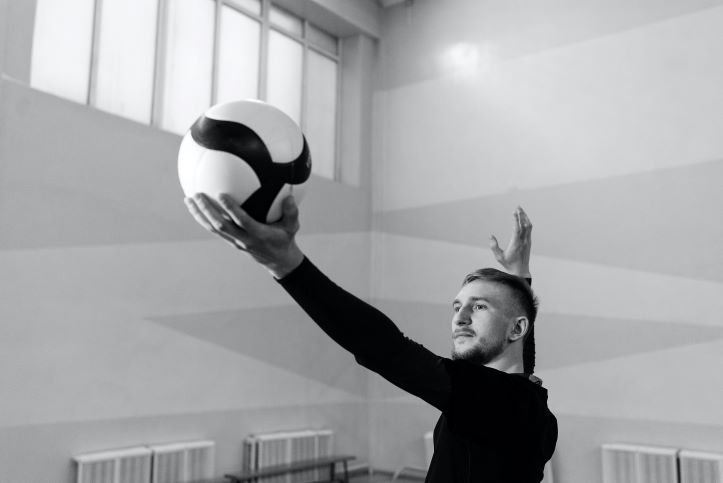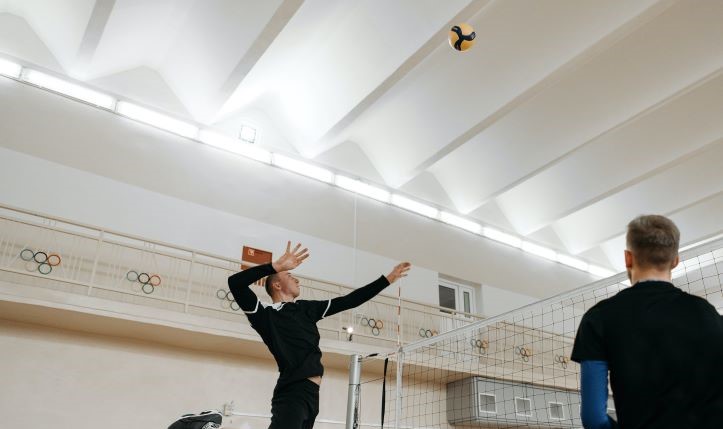Those who want to learn how to become a professional volleyball player, becoming a professional volleyball player is their dream. It’s a journey full of love for the game, excitement, and hard work. What does it really take to get to the top of this sport, though? We are going to share the tips and tricks that can help you move up the ranks and reach your goal of becoming a professional volleyball player in this book.
We’ll talk about the most important things you need to do to have a great volleyball career, from improving your skills to staying in top shape. We’ll also talk about the mental side of the game, how important teaching is, and how important it is to network and stand out. Are you a young fan with big dreams or an experienced player who wants to make it big? This guide will help you get started on the path to becoming a professional volleyball star. Now, tie your shoes and grab your volleyball. Let’s learn how to become a successful volleyball player.
Requirements To Be A Professional Volleyball Player
If you want to become a professional volleyball player, you need more than just skill and desire. If you meet these requirements, you’ll be ready to make your mark in the volleyball game. What it takes is broken down below:
Strong Physical Fitness
- Volleyball demands agility, strength, and endurance.
- A good level of cardiovascular fitness is crucial.
Skill Mastery
- Proficiency in serving, passing, setting, spiking, and blocking is a must.
- Ball-handling skills, including digging and diving, are vital.
Mental Toughness
- The ability to stay focused and positive, even under pressure.
- Resilience to cope with setbacks and learn from failures.
High Volleyball IQ
- Understanding the game’s strategies, rules, and tactics.
- Quick decision-making on the court.
Exceptional Teamwork
- Effective communication with teammates.
- The willingness to collaborate and support others.
Coachability
- Being open to feedback and guidance from coaches.
- Willingness to constantly improve and adapt.
Competitive Spirit
- The drive to consistently push your limits and compete at a high level.
- A burning desire to win and achieve your goals.
Proper Equipment
- Well-fitting volleyball shoes, knee pads, and comfortable sportswear. Learn the difference between basketball shoes and volleyball shoes for accurate choosing.
- Quality volleyball for practice and games.
Time Commitment
- Dedication to regular practice, training sessions, and games.
- Balancing your time for volleyball with other life responsibilities.
Educational and Career Planning
- Preparing for life beyond volleyball, including education or job prospects.
- Having a backup plan for the future.
Main 2 Types of Professional Volleyball Career
If you’re passionate about pursuing a volleyball pro career, you have exciting options to consider. Volleyball offers two primary avenues for professionals to showcase their skills and compete at the highest levels. They are “Professional Indoor Volleyball” & “Professional Beach Volleyball”.

Professional Indoor Volleyball
Indoor volleyball is the traditional and widely recognized form of the sport. It’s played on an enclosed court with six players on each side. Here are the key aspects of a professional indoor volleyball career:
- Team-Based Play: In indoor volleyball, you’ll join a team, and success depends on seamless cooperation with your teammates. It’s a collective effort to win matches and championships.
- International Leagues: There are professional indoor volleyball leagues in many countries. So you can play against people from all over the world. Some players even participate in prestigious international tournaments like the Olympics.
- Structured Seasons: Indoor volleyball typically follows a seasonal structure with pro volleyball league games, playoffs, and championship events. This organized format allows you to showcase your skills over the course of a season.

Professional Beach Volleyball
Beach volleyball, on the other hand, offers a unique and exhilarating twist to the game. It is played on the sandy shores with two players on each team. Also, you can build a sand volleyball court in you backyard or somewhere. It’s a fast-paced, high-energy sport. Here’s what you need to know about a career in professional beach volleyball:
- Dynamic Duos: In beach volleyball, it’s all about forming a successful partnership with one other player. The synergy between you and your partner is paramount for victory.
- World Tours: Beach volleyball is popular worldwide, and players often participate in international tours. These tours take you to stunning beach destinations and give a taste of diverse playing conditions.
- Flexible Scheduling: Unlike indoor volleyball, beach volleyball events often follow a more flexible schedule. It provides opportunities for players to compete in various locations throughout the year.
13 Strategies on How To Become A Professional Volleyball Player
Here are some proven effective strategies from professional volleyball coaches on how to get better at volleyball. Follow these steps to volleyball professionalism.
# Start Young & Join Youth Leagues
Starting your professional volleyball career early is smart. Starting young gives you time to improve and gain experience. You’ll learn volleyball fundamentals like serving and spiking as you progress.
Joining local youth leagues is crucial. Leagues for all skill levels and ages provide a friendly and fun environment. They offer systematic coaching, competitive contests, and teamwork lessons. Many volleyball stars started in local youth leagues, giving them a perfect starting point for aspiring players. Starting early and joining local youth leagues is crucial to professional volleyball success.
# Develop Basic Skills
If you want to become a professional volleyball player, you need to learn the basics first. This means getting a firm grip on the basics of the game, including serving, passing, and hitting. Here’s why focusing on these core skills is crucial:
Master the fundamentals (serving, passing, and hitting): Basic volleyball skills are the foundation of a successful career. Serving, passing, and hitting are the building blocks upon which more advanced techniques are built. Serving effectively ensures you can control the start of the rally. Accurate passing sets up opportunities for your team to attack. And hitting, whether it’s a powerful spike or a well-placed tip, is how you score points. These basics are non-negotiable, and professional players never stop refining them.
Work on your hand-eye coordination: Volleyball is a fast-paced sport that requires split-second decision-making. Developing exceptional hand-eye coordination is essential to react swiftly and accurately to the ball’s trajectory. By honing your coordination skills, you’ll be better equipped to serve, pass, and hit with precision. Training exercises that challenge your hand-eye coordination, such as juggling or reaction drills, can significantly enhance your performance on the court.
# Be Disciplined
Professional volleyball players must be disciplined to succeed. Discipline is crucial in a sport that requires dedication and consistency. More than merely being on time to sports or practice, discipline is a pledge to do your best. It means improving your talents, being fit, and staying focused. Professional volleyball players that never quit succeed. They sacrifice, stick to rigid exercise programs, and prioritize fitness to perform well.
Discipline goes beyond physicality. It requires mental toughness, endurance, and emotional control. Professional volleyball players must overcome failures, keep focused, and improve. These traits distinguish the finest athletes mentally and physically.
# Find a Great Volleyball Coach
If you want to play volleyball professionally, getting the right coach can make all the difference. Professional coaching is necessary, not merely beneficial. Here’s why:
A great coach guides you like a compass. They can improve your abilities, game sense, and potential with their expertise, experience, and insights. Coaches give feedback, correct faults, and advise on all aspects of the game. Their knowledge in strategy, tactics, training, and mental preparation can help you progress.
Learn Advanced Techniques From the Coach
While the basics are important, a good coach can teach you advanced skills to stand out. These techniques may be your hidden weapon for great performance. Advanced skills like serving, setting, and spiking can take your game to the next level.
# Join a Competitive Professional Volleyball Team
Becoming a professional volleyball player requires playing on a competitive team. Competitive teams let you show off your skills and learn from the best. School and club teams offer skilled coaches and passionate players who share your passion for sports. Such a squad exposes you to higher-level play, which is crucial for progress.
Competing against tough opponents is where you really improve. It demands adaptability, strategy, and performance. Competing harder gives you more chances to improve. As you play powerful opponents, your abilities and game knowledge will improve faster.
# Focus on Fitness and Conditioning
A muscular and agile body is essential to becoming a professional volleyball player. Cardio and strength training help you achieve this. Here’s why fitness and conditioning are essential:
Maintain a strong and agile physique: In volleyball, your body is your most valuable asset. Strong, nimble muscles improve performance and reduce injury risk. Court success requires speed, agility, and endurance. Building a strong physical and conditioning foundation keeps you in top form.
Cardio and strength training are key: Cardiovascular fitness is crucial to keep up with the fast-paced nature of the game. It helps you move quickly, change direction, and stay energetic during a battle. Spiking the ball or blocking opponents requires strength training for power and explosiveness. Professional volleyball requires peak physical condition, which can be achieved through cardio and strength training.
# Grow Mental Toughness
Both your body and mind need to be tough if you want to play volleyball professionally. Minds need to get better in order to handle the ups and downs of wins and losses. No matter what happens, you have to keep going and push yourself to get better. It’s also very important to stay focused during games. It helps you decide quickly, read the game properly, and do well when you’re stressed out.
It’s also important to stay positive. It not only makes you feel better, but it also helps your team do better. When you play elite volleyball, you need to be mentally tough to stay safe. It makes you want to be the best and gets you through hard times. You’ll need to be mentally tough to do well whether you’re behind in a game or have a tough practice coming up.
# Believe in yourself
Volleyball is hard, so believe in yourself. It’s knowing you can manage any issue, learn from your mistakes, and improve. When you believe in yourself, you know you can succeed even against stiff competition. This thought encourages you and others. How you think turns issues into opportunities and mistakes into progress.
Remember that self-trust is your greatest asset while you pursue professional volleyball. It sustains you through the toughest workouts, craziest games, and self-doubt. Maintain your self-confidence and allow it to guide you through your volleyball career’s ups and downs. Believe in yourself, achieve your goal, and share your unflinching confidence.

# Be Persistent and Be Patient
Failures and problems are common in professional volleyball. Determination keeps you going no matter how hard things get. It’s the drive to work hard, learn, and grow even when things go wrong. When you’re struggling with a losing streak or a tough training regimen, remember that every stride backward might be a step forward.
Patience matters too. Like life, volleyball improvement requires time. Knowing that improvement takes time and learning from mistakes. Be patient with your skill development—it takes time. This trip has several steps, each one improving you.
# Attend Volleyball Camps
Volleyball camps are hands-on learning opportunities volleyball skills development, learn about the game, and get professional help. These camps often teach serve, pass, spike, block, and strategy. Go for concentrated top-notch training and coaching.
Volleyball camps are great because you can learn from experts. These camps often feature professional athletes and skilled coaches who can offer new ideas, suggestions, and methods not found in your regular practice sessions. Talking to these professors can change everything. They help volleyball players grow and make contacts.
# Record a Good Video and Analyze
You can see your performance better than others by recording your games. It’s like a mirror to evaluate your floor-cutting skills. Videoing these occasions during a practice, professional volleyball league game, or tournament match helps you develop.
Identify areas for improvement
By analyzing your games, you can identify areas for improvement. It might be your service, position, or response time. Watching oneself play reveals your strengths and flaws. Setting improvement goals and creating a professional volleyball training plan requires self-evaluation.
# Build Network and Get Noticed
Networking and visibility play a significant role in your volleyball athlete journey.
Attend college recruitment events
Show your skills at college marketing events. These events allow you to talk to college teachers, scouts, and recruiters. You can show off your skills and learn about academic and sports opportunities by going. Meet other volleyball players and learn about your next move.
Create a highlight reel for scouts
Highlight reels showcase your best. Your best plays are selected to showcase your court abilities, quickness, and talent. Players with good highlight reels may attract scouts and professors. This can get you noticed by colleges and professional scouts.
# Pursue a College Scholarship
Education isn’t a backup plan—it’s essential for professional volleyball success. Many professional athletes went to college and excelled. A solid education helps you gain several professions, control your mind, and follow rules. Education gives you life skills like time management and critical thinking that you may utilize in volleyball.
College volleyball is a terrific way to improve and get noticed. College teams offer high-level competition and professional advice. You’re closer to being a pro. When you compete in college, scouts will notice you and give you more chances to shine.
College sports help you improve and attract professional coaches. Successful college students may receive tryout requests or professional volleyball team offers. College games are a great way to attract professional recruiters because scouts watch for talented athletes.
Volleyball Practice Routines
A perfect volleyball practice routine makes the process easier. So, here is the guide from the expert coaches for your daily volleyball practice.
# Warm-up (10 minutes)
- Begin with light jogging and stretching exercises to loosen your muscles and prevent injury.
- Incorporate dynamic warm-up drills, like high knees, butt kicks, and lateral movements, to get your heart rate up.
# Blocking and Net Play (15 minutes)
- Focus on your blocking technique and timing. Work on jumping higher in volleyball and net presence.
- Perform solo blocking drills or use a partner to simulate game situations with different angles and attack speeds.
# Service Reception (10 minutes)
- Concentrate on service reception to improve your passing accuracy.
- Have a teammate serve balls from different positions and angles, forcing you to adapt quickly.
# Defensive Positioning (15 minutes)
- Practice your defensive positioning and quick reactions by simulating spikes and digs.
- Work with a coach or teammate who delivers hard-hit balls for you to dig and return.
# Spiking Variations (20 minutes)
- Enhance your spiking skills by incorporating variations in your approach and technique.
- Practice spiking from various points on the court, using both powerful spikes and controlled shots.
# Communication and Transition Play (10 minutes)
- Focus on team communication and transition play.
- Engage in exercises that emphasize quick switches between offense and defense, ensuring everyone is on the same page.
# Sprint and Agility Drills (15 minutes)
- Improve your agility, speed, and reaction time with sprint and ladder drills.
- These drills simulate the quick movements required on the court.
# Mental Training (10 minutes)
- Dedicate time to mental exercises, such as visualization and relaxation techniques.
- Work on your focus, concentration, and positive mindset.
# Cool-down and Flexibility (10 minutes)
- Finish with stretching exercises to improve flexibility and reduce the risk of muscle soreness.
- Pay special attention to areas used most during the practice.

Tips for Professional Volleyball Playing
Here are additional volleyball player success tips to guide your journey:
- Study the Game: Watch professional matches and dissect the strategies employed by elite players and teams. This can provide valuable insights into the nuances of the sport.
- Nutrition Matters: Fuel your body with the right nutrients. A balanced diet is crucial for maintaining energy levels and enhancing recovery.
- Recover Smart: Pay attention to recovery methods such as stretching, ice baths, and proper sleep. Effective recovery keeps your body in peak condition.
- Communication Skills: Develop effective communication with your teammates. Clear and concise communication on the court can prevent errors and foster better teamwork.
- Adaptability: Volleyball games can change in an instant. Adapt to varying situations and game conditions by staying flexible and versatile.
- Pre-Game Routine: Establish a pre-game routine that helps you focus and get into the right mindset. This can include visualization, warm-up exercises, and mental preparation.
- Learn from Defeats: Losses are opportunities for growth. Analyze your defeats, understand what went wrong, and use these experiences to improve.
- Goal Setting: Set specific, measurable, and achievable goals for your volleyball career. Having clear objectives keeps you motivated and on track.
- Balance and Burnout: Maintain a healthy balance between your volleyball pursuits and personal life. Avoid overtraining, which can lead to burnout and injury.
- Mind Your Body Language: Body language can convey confidence and positivity. Maintain an upright posture, use encouraging gestures, and inspire your team through your demeanor.
One additional tip is to keep your volleyball clean after every game and practice session. A good-looking and clean ball will help you maintain its grip and ensure it performs at its best.
Conclusion
We can say that we have covered everything how to become a professional volleyball player. In professional volleyball, the journey is hard and exhilarating. Excellence is about having a strong mind, continually learning, and being fully committed, not just being physically powerful. The challenge requires skills, strategy, and self-confidence on the hard court or sand. Be patient, persevere, and realize networking’s potential.
As you pursue your academic and athletic goals, look into colleges, and strive to be noticed. Remember that to succeed in professional volleyball, you must keep improving and believe you can reach the top. Also, with the correct attitude, talents, and network, you can spike, set, and serve your way to professional excellence. Write your own volleyball story, and the journey is as intriguing as the result.
FAQs
Can I get paid to play volleyball?
Yes, you can get paid to play volleyball professionally. Many leagues, clubs, and national teams offer contracts to talented players. They provide salaries and opportunities for sponsorship deals. Top-tier players in well-established leagues can earn six-figure salaries, while lower-level or emerging players might earn more modest incomes. It’s a competitive field, but with dedication and skill, a professional volleyball career is attainable.
What skills do you need to be a pro volleyball player?
To become a professional volleyball player, you need a combination of physical and mental skills. These include exceptional volleyball skills like serving, passing, setting, spiking, blocking, and defense. Strong communication, teamwork, agility, speed, endurance, and a positive mindset are equally important. Being mentally tough, adaptable, and dedicated to continuous improvement is key for success in the professional volleyball world.
Can I play volleyball at 13?
Absolutely! You can start playing volleyball at 13. Volleyball is a sport that welcomes players of all ages. Many players begin their volleyball journeys in their early teens. Joining a local youth league or school team is a great way to get started and develop your skills.
Is volleyball an Olympic sport?
Yes, volleyball is indeed an Olympic sport. It has been a part of the Summer Olympics since 1964. Both indoor and beach volleyball are featured in the Olympic Games, showcasing the sport’s diversity and popularity on a global stage.
Is it easy to play volleyball?
Volleyball can be more mentally challenging than it initially appears. While the basic physical skills are accessible to beginners, the mental aspects of the game, such as quick decision-making, communication, and maintaining a positive mindset under pressure, can be quite demanding. As you get better at volleyball, the mental side of things becomes more important. This means that you need to be good at both physical and mental skills to be successful.
Can everyone play volleyball?
Yes, almost anyone can play volleyball from Grade School to Retirement. It’s a sport that’s inclusive and welcomes players of various ages, sizes, and skill levels. Adaptations, such as sitting volleyball, have made it accessible to people with disabilities.
What is the income in volleyball?
The income of professional volleyball players in countries like Brazil, Italy, Russia, and the United States can range from several thousand dollars to six figures or more. It depends on factors such as the player’s skill level, experience, and market demand. In some cases, top players in these countries have earned salaries exceeding $1 million, with additional income from sponsorships.
Can your hair hit the net in volleyball?
In volleyball, your hair can legally touch the net without a violation. The rules primarily focus on parts of the body and clothing, such as hands, arms, and feet, making contact with the net during play. As long as your hair doesn’t interfere with the ball or the game in any way, it’s not considered a foul.
What country sport is volleyball?
Volleyball was invented in Holyoke, Massachusetts, USA, in 1895 by William G. Morgan. It was initially created as a less physically demanding alternative to basketball and quickly gained popularity. Since its inception, volleyball has become a widely played and recognized sport not only in the United States but also around the world.
Is volleyball a successful sport?
Yes, volleyball is considered a successful sport. It has achieved global recognition and popularity, with a strong following of both players and fans. Volleyball is featured in the Olympic Games and has a rich history of competitive leagues and events worldwide. There are more than 200 countries that belong to the International Volleyball Federation (FIVB).
Is volleyball a lifelong sport?
Yes, volleyball is often considered a lifelong sport. Unlike some sports that may have age limitations, volleyball can be played by people of all ages. There are various levels of play, from casual recreational games to competitive leagues for older adults. Additionally, adaptations like sitting volleyball make the sport accessible to individuals with disabilities.








